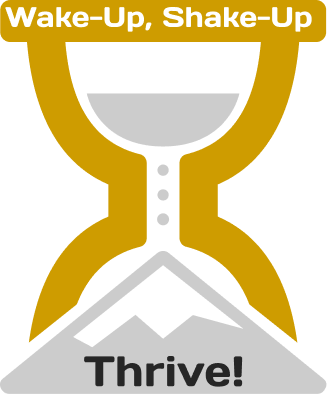May, often called the month of change, brings with it a real sense of transition. From swapping out winter clothes to embracing warmer weather and adjusting our mindsets, the season often nudges us to shift. To think differently. While most people welcome these spring changes with open arms, anticipating and managing life change isn’t always as welcome.
In this month’s Disruptor, we explore change in the context of modern aging by drawing insights directly from our book: ‘Wake-Up, Shake-Up, THRIVE! How to Lift Up Your Life in Your 50s and Beyond — Swiss secrets to not growing old.’
Wake-Up
Aging frequently prompts the need for significant lifestyle adjustments, including everything from retiring or forming new social connections to adapting to changes in our aging bodies.
While younger adults may not feel an immediate urgency to modify their health or financial behaviors due to the delayed onset of negative repercussions, we’ve noticed that these effects gain a sense of urgency as we age.
Despite older adults being less inclined to initiate behavioral changes, research suggests that we are more likely to sustain any changes we do make. This resilience may stem from the strong connection between more mature emotions and decision-making processes.
So, it’s never too late to wake-up to change!
“Change the way you look at things and the things you look at change.” — Wayne W. Dyer
Shake-Up!
How do you anticipate and manage change?
The change curve, based on the pioneering work of Elisabeth Kübler-Ross, illustrates the emotional journey individuals undergo when confronted with change and transition.
This curve comprises 5 distinct stages: Shock and Denial, Anger, Bargaining, Depression, and Acceptance. Let’s delve into each stage using an example relatable to all (COVID):
- Shock and denial: Initially, when faced with change, it’s common to resist acknowledging its reality, almost attempting to dismiss it as unreal or unnecessary. Example: “COVID-19 is just another flu!”
- Anger: As denial fades, anger or blame often surface. You may find yourself frustrated or upset, feeling that the situation is unfair or undeserved. Example: “It’s not fair! This stupid virus is going to make me miss out on…”
- Bargaining: Subsequently, bargaining tendencies emerge as you begin to adjust to the new reality and understand its implications. Example: “I guess I’ll need to make some minor adjustments like working from home, shopping online, etc. It’s so inconvenient. I hope it won’t last long.”
- Depression: As the journey progresses, you may experience a downward emotional spiral, marked by attempts to cling to the past. Energy levels and morale may fluctuate, accompanied by feelings of confusion, sadness, or even depression. Example: “2020 is an awful year! This can’t really be happening. I’m not sure how much longer I can handle the lockdowns and quarantines.”
- Acceptance: Finally, you reach a point where you deeply accept that change is inevitable and resolve to embrace the new normal. It’s only at this stage that you can begin to explore new, positive possibilities and integrate them into your evolving reality. Example: The “silver lining” today often expressed by COVID.
We trust that this (COVID) example strikes a chord with you and offers a fresh perspective on life’s unavoidable transitions. By thinking through these stages in your own context, you can approach change with greater flexibility.
“The encouraging news is that, with age, comes enhanced emotional control, stability, and more effective coping mechanisms, all contributing to an increased adaptability throughout your lifetime!” — Ellen & Dominique
Thrive!
Reflecting on your journey through change is a powerful exercise in self-awareness and resilience. Try the following exercise:
- Reflect on a significant life transition you’ve undergone.
- Can you identify the stages of change you encountered?
- How did you manage them?
- Where did you succeed and where did you get stuck?
- Utilize this introspection and awareness to assess your readiness for the transitions ahead.
- Repeat often
As you contemplate the stages you’ve successfully navigated and the challenges you’ve overcome, remember that you’re never alone in life. Social support plays a crucial role in effectively adapting, offering a network of encouragement, understanding, and companionship.
Studies have consistently shown that individuals with strong social connections experience better physical and mental health, are more likely to live longer, experience less chronic disease, and report higher levels of life satisfaction.
So, as you grow older (not get old!), lean into cultivating meaningful relationships to redefine what it means to age gracefully and vibrantly!
Get our Book!
If you found value in this month’s edition and would like more insights like this, download the first two chapters of our book here: https://www.wakeupshakeupthrive.com/my-book/ and for those seeking a tangible guide, hardcopy versions in English and French are available on Amazon at: https://www.amazon.com/Wake-Up-Shake-Up-Thrive-secrets-growing/dp/1912597187/ref=sr_1_1?crid=683PX7BFJ65S&keywords=wake-up%2C+shake-up%2C+thrive&qid=1654236065&sprefix=wake-up%2C+shake-up%2C+thrive%2Caps%2C157&sr=8-1.
Don’t Grow Old Waiting!
Thrivingly,
Ellen & Dominique

